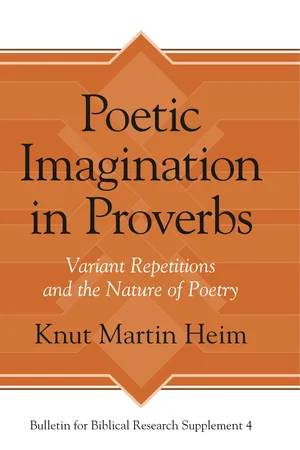
Poetic Imagination in Proverbs
Variant Repetitions and the Nature of Poetry
- 552 pages
- English
- PDF
- Available on iOS & Android
About This Book
No fewer than 223 verses in Proverbs appear two times (79 sets), three times (15 sets), or even four times (5 sets) in identical or slightly altered form—more than 24% of the book. Heim analyzes all of these, presenting them in delineated Hebrew lines and in English translation. Where appropriate, the translations are followed by textual notes that discuss uncertainties regarding the textual witnesses (textual criticism) and explore lexical, grammatical, and syntactical problems. Heim also analyzes the way the parallelism in each verse of a variant set has been constructed, presenting diagrams and tables with columns that highlight the corresponding similarities and differences among repeated verses. Key to this investigation is the search for links between the variants and their surrounding verses, such as repetitions of sound and sense.
Heim shows that most variant repetitions result from skillful poetic creativity. Reconstruction of the editorial and creative poetic process highlights what poets did, how they did it, and why they did it. He develops criteria for determining the direction of borrowing between the verses and demonstrates that the phenomenon of variant repetition is an editorial concern that operates on the level of the book as a whole. He develops and refines a range of interpretive techniques and skills, arrives at fresh interpretations, and shows that ancient proverbial wisdom is relevant to modern societies.
This study sheds new light on the nature of biblical poetry and on the methods and virtues best suited for its study. While specific to the book of Proverbs in the first instance, the findings in this study apply to poetry elsewhere. Three fundamental insights should inform future work on poetry: the creative combination of repetition with variation is the very essence of poetry; what has been written with imagination should be read with imagination; imaginative interpretation values the normal features of poetic expression and celebrates the truly unusual.
Frequently asked questions
Information
Table of contents
- Preface
- Abbreviations
- Contents
- Introduction: Review of Recent Literature and Methodology
- Introduction to the Structure of Proverbs 1–9
- Variant Sets 1–5
- Variant Sets 6–12
- Variant Sets 13–17
- Variant Sets 18–22
- Variant Sets 23–25
- Variant Sets 26–33
- Variant Sets 34–41
- Variant Sets 42–47
- Variant Sets 48–52
- Variant Sets 53–59
- Variant Sets 60–66
- Variant Sets 67–74
- Variant Sets 75–80
- Variant Sets 81–85
- Variant Sets 86–92
- Variant Sets 93 to 96
- Variant Repetitions and Editorial Strategies
- Conclusion
- Index of Authors
- Index of Scripture
- Index of Subjects